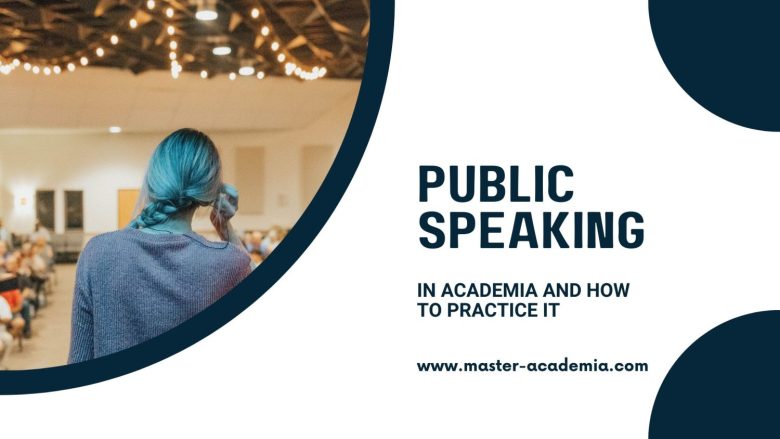
Public speaking is an important skill to master in academia. It is also a common source of anxiety. Luckily, public speaking is a skill that can be learnt and gets better with practice. Find out why public speaking is so important in academia, and how to practice it.
Contents
The importance (and fear) of public speaking in academia
The fear of public speaking is a very common phobia, according to a 2009 publication in the Journal of Anxiety Disorders. Even people who are generally not socially anxious can have a pronounced aversion to public speaking.
In a recent poll on Twitter, I asked what crucial skills tend to be neglected, but should be included in all PhD education. A staggering 55% of voters said the most crucial skill was public speaking.
What makes a good public speaker? The internet is full of tips, with quality content and advice being accessible for instance by the Harvard Professional Development Programs and free courses, for instance, Google Digital Garage.
I do not want to repeat this advice here (e.g. how to develop a storyline, know who your audience is, etcetera). Instead, I want to focus on the why and how: Why is public speaking so important in academia? And how to practice it?
The importance of public speaking in academia
A recent study by Buser and Yuan (2020) found that the extent of aversion to public speaking is a significant predictor of career expectations among economics and business students. I am not aware of a similar study exploring general career prospects in academia. Nonetheless, it seems fair to assume that public speaking has some influence on academic careers as well:
Public speaking is an important skill in academia because it affects many facets of academic work, including conference presentations, research dissemination and teaching. The extent to which public speaking is mastered likely affects academic career prospects.
Nowadays, universities increasingly look for all-round academics who excel in various tasks, including teaching and research dissemination. Think of research dissemination. There are, of course, conferences where academics present and share their findings. A good presentation creates interest in your work and helps you to grow your network. These connections can be extremely useful when looking for research collaboration or academic positions in the future.
At the same time, increasing emphasis is placed on the wider societal impact of research. For many job applications, you have to showcase how you connect with society at large, and how you shape practice or influence policy decisions. A good way to reach the wider public is through talks such as TED Talks, webinars or podcasts. You would want to be confident and a good public speaker when participating in these types of activities.
Then there is of course teaching. Being a confident public speaker helps immensely to convey lectures and seminars. And it decreases the stress level of the lecturer considerably. How you speak is often as important – if not more important – than what you say when it comes to capturing students’ attention and enhancing their learning.
It is not impossible to become a successful academic while avoiding public speaking at all costs. But it can surely negatively affect your career prospects. More importantly,
a fear of public speaking, or discomfort with it, can make your working life stressful and miserable.
And you will be confronted with it repeatedly. These are very good reasons to start practising public speaking!
How to practice public speaking in academia
A study by Grieve et al. (2021) found that students in higher education in Bristol, who feared public speaking, were particularly concerned about: being judged; developing physical symptoms when speaking publicly such as shaking hands; and making content mistakes. Furthermore, most students highlighted the importance of practising. And they were right. This is what you can do:
Explore training opportunities at your university
Not only is public speaking a skill that can be learnt. Public speaking anxiety can be tackled as well: A study by LeFebvre et al. (2020) found that an introductory speaking course can cut the intensity of public speaking anxiety among students in higher education in half! Therefore: check whether your university offers any public speaking training. If not, ask your supervisor or department if something can be organised. Or try to organise something yourself. It will pay off.
Practice consistently
This may come as no surprise. Maybe you are a rare natural talent, but most of us simply cannot expect to be great public speakers without putting in any work. Instead, we need to practice, practice, practice. Practice your presentations at home. Record yourself. Review how you speak. Maybe you include too many uuummms and eeeehs?
Scale down your speaking notes
I’d never advise anyone to type out a presentation on a computer, and then print out pages of ‘speaking notes. Instead, start with handwritten notes. It takes longer but makes you remember your key points much better. Whenever I prepared handwritten note cards in the past, I hardly needed them while they provided me with a sense of security. The next step is to decrease the number of words on your cards. Slowly but surely, you will realise that you can formulate full sentences spontaneously. And that you are much better at improvising than you expected. At some point, your PowerPoint slides (if you have any) will be enough of mental help to keep you on track when speaking publicly.
Scale down your speaking notes
Start speaking to yourself, your wall or your mirror. Then, present it to a friend or a well-meaning family member. Describing your research, for instance to someone completely unfamiliar with your topic, can be challenging. And frankly, quite annoying. But use these little moments as opportunities to practice. Talk about your research in many settings. When meeting with your supervisor, prepare a short presentation of your progress. Do you have nice colleagues? Present to each other. Does your department have some internal research discussions? Push yourself to speak. No one expects you to deliver an amazing speech to a room full of strangers during the first week of your studies. Scale up your audience slowly, and slowly push yourself out of your comfort zone.
Learn to be comfortable with silence
This is the bonus tip. We tend to think that we need to speed through everything. That silences are bad. In reality, they are not. Take your time to collect your thoughts. A few seconds of silence may feel like a lifetime to you, but won’t even be noticeable to your audience. You can practice being comfortable with silence in all aspects of life, and it will have a positive effect on your public speaking in academia as well. Some even call it a superpower!




